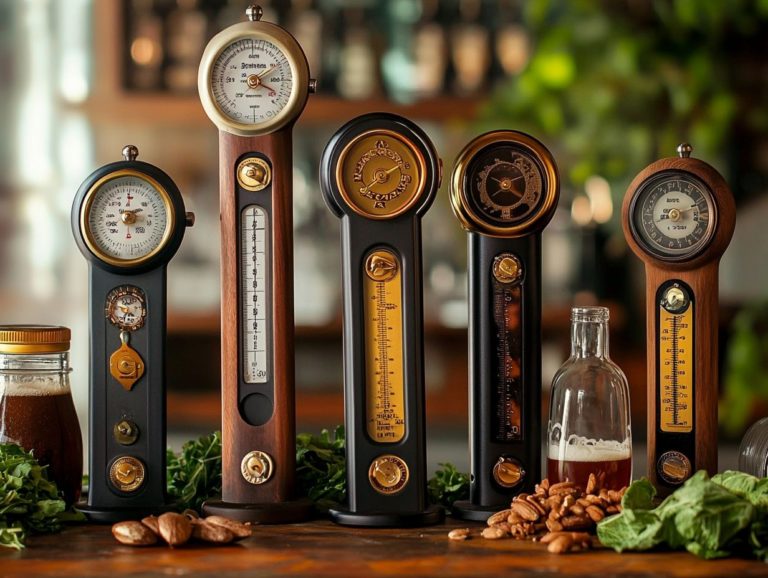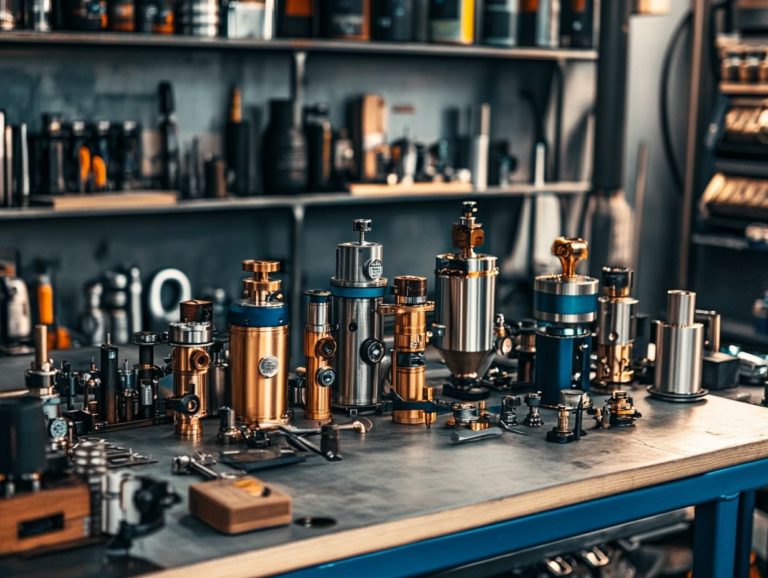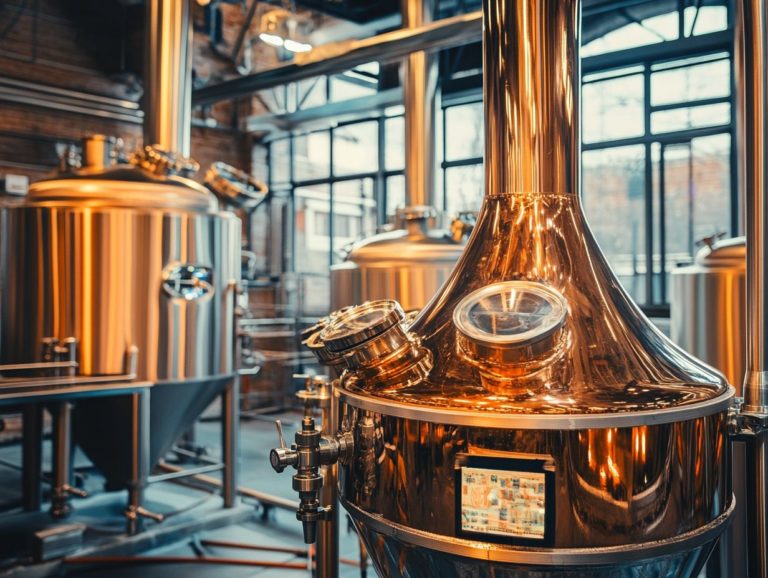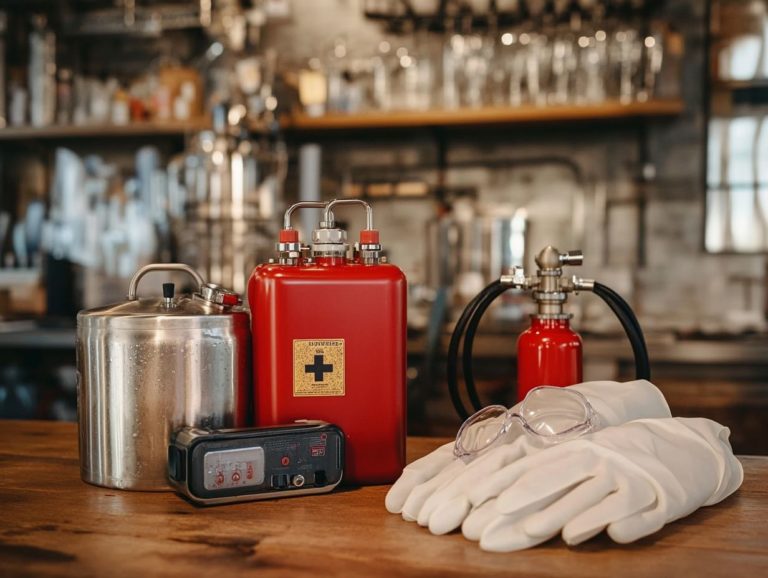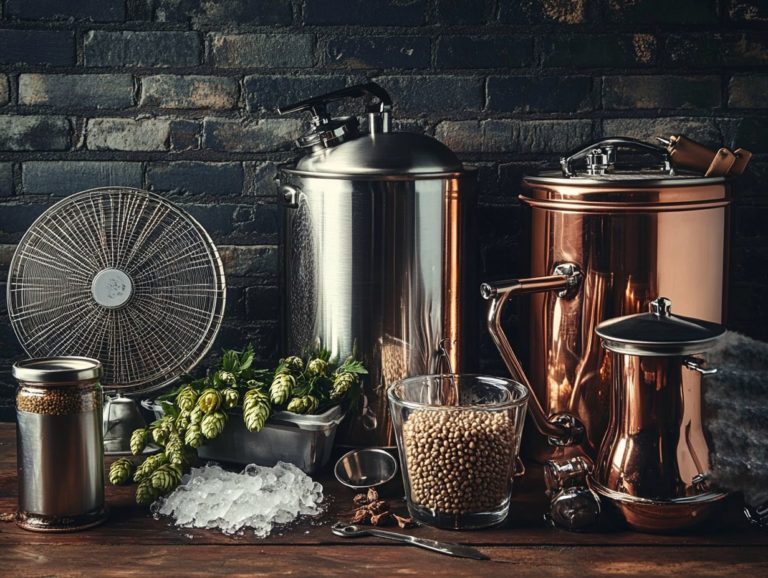5 Essential Tools for Home Brewing Success
Home brewing has become a delightful trend, transforming many enthusiasts into skilled artisans who create unique brews right in their own kitchens. With the right brewing tools and knowledge, anyone can produce high-quality beer.
To succeed in this rewarding hobby, you need to have the right brewing tools at your disposal, such as a brewing kettle and a fermenter.
Here are five indispensable items every home brewer should possess:
- Top-quality brewing equipment, including a brewing kettle and fermenter.
- Precise measuring tools, like a brewing scale or digital scales.
- Reliable thermometers, including brewing thermometers.
- Effective sanitization supplies, such as sanitizers and cleaning solutions.
- Innovative brewing software or apps.
Whether you re just starting out or you re a seasoned brewer, these tools, including wort chillers and brewing paddles, will elevate your brewing experience and guarantee delicious results.
Contents
- Key Takeaways:
- 1. Quality Brewing Equipment
- 2. Accurate Measuring Tools
- 3. Reliable Thermometer
- 4. Sanitization Supplies
- 5. Brewing Software or Apps
- What Is Home Brewing and Why Is It Popular?
- What Are the Different Types of Home Brewing Equipment?
- How Can Accurate Measuring Tools Improve the Brewing Process?
- Why Is a Reliable Thermometer Important in Home Brewing?
- What Are the Benefits of Using Sanitization Supplies in Home Brewing?
- How Can Brewing Software or Apps Help with Home Brewing Success?
- Frequently Asked Questions
- What are the 5 essential tools for home brewing success?
- Why do I need a thermometer for home brewing?
- What is the purpose of a hydrometer in home brewing?
- What type of fermenter should I use for home brewing?
- Why is a siphon important for home brewing?
- Do I need to have bottles or kegs for home brewing success?
Key Takeaways:
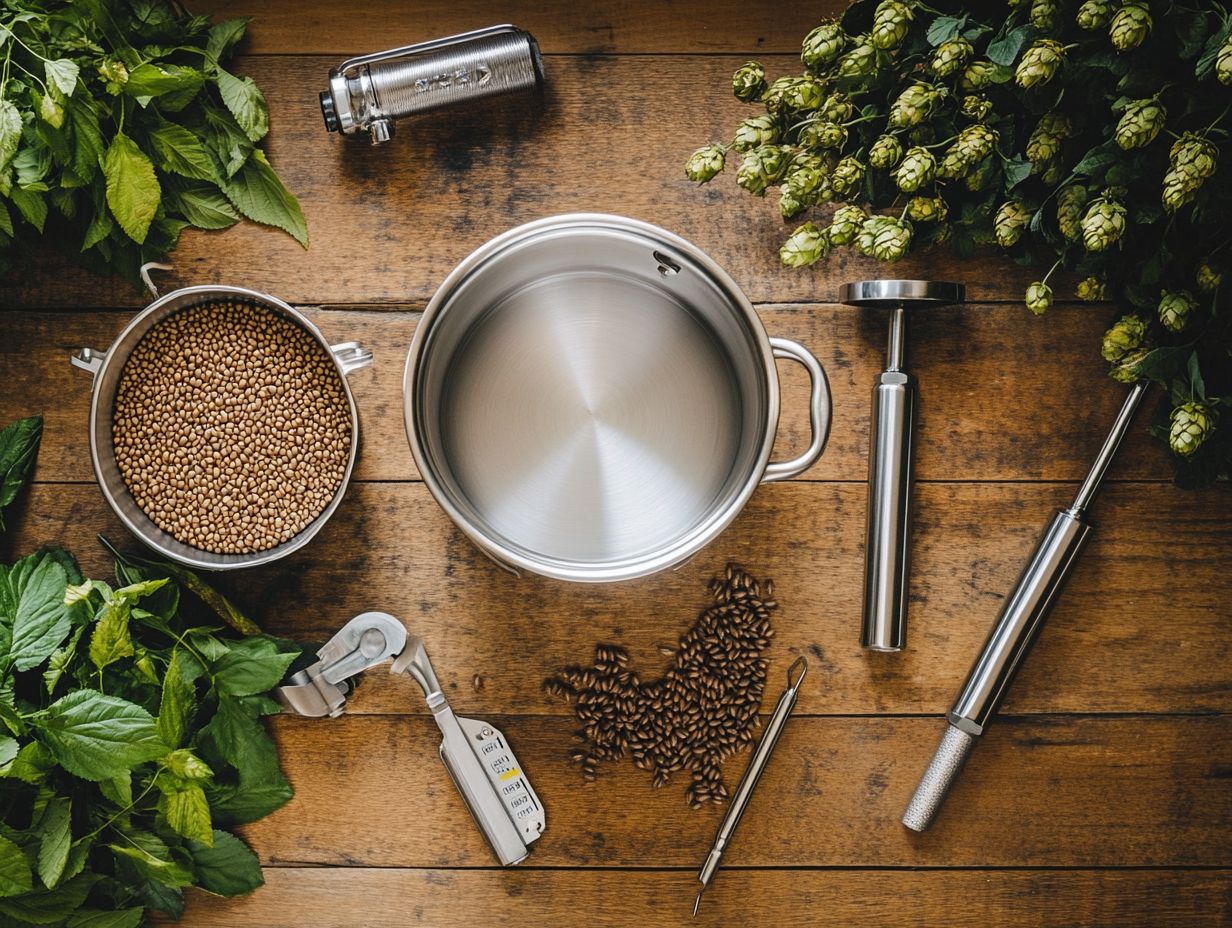
- Invest in quality brewing equipment for a better home brewing experience.
- Accurate measuring tools are essential for consistency and precision in brewing.
- A reliable thermometer ensures proper temperature control for successful brewing, which is crucial for maintaining the quality of your beer.
1. Quality Brewing Equipment
When you embark on the rewarding journey of home brewing, selecting quality brewing equipment becomes paramount to achieving outstanding results. A well-designed brewing kettle, versatile fermenters, and durable fermentation containers are essential components that significantly contribute to your brewing process.
By investing in high-quality materials, such as stainless steel, you enhance the longevity of your brewing setup and elevate the quality of the beer you create. Whether you opt for brewing kits, a conical fermenter a specialized fermenter that allows for better separation of yeast and sediment or an oak barrel to infuse unique flavor profiles, the right equipment can transform your brewing adventures into remarkable experiences.
For example, a brewing kettle, typically crafted from stainless steel, provides excellent heat distribution and wards off rust, making it a critical staple for any brewer. Fermenters, available in styles like buckets or carboys, offer you the flexibility to cater to your batch size and fermentation needs. Ensure your fermentation containers, whether glass or plastic, are airtight to maintain optimum conditions for your brew. Use fermentation airlocks and racking canes for smooth transfers.
If you’re just starting out, extract kits can streamline the brewing process, while all-grain kits are perfect for the more advanced brewer seeking greater control over the grain mash. Partial mash kits offer a middle ground for those looking to experiment. Each piece of equipment plays a crucial role in defining the flavors and quality of your final brew, underscoring the importance of making informed choices in your brewing journey.
Ready to start brewing? Gather your tools and dive into the exciting world of home brewing today!
2. Accurate Measuring Tools
Accurate measuring tools are essential in your homebrewing journey. They empower you to achieve precise ingredient measurements and maintain consistency across your batches.
Using a hydrometer allows you to accurately assess sugar content. This is crucial for determining the potential alcohol content after fermentation.
Using brewing scales or digital scales helps ensure proper ingredient ratios.
Reliable brewing scales lead to a controlled fermentation process and a superior final product.
This level of precision translates directly into enhanced flavor profiles. You can fine-tune your recipes and achieve the desired taste.
With accurate measurements, consistency across different batch sizes becomes attainable. This significantly reduces the risk of unexpected variations.
Monitoring variables like temperature and gravity empowers you to make informed adjustments. This ensures each new creation is just as enjoyable as the last.
Utilizing brewing thermometers and hydrometers can help in this regard.
3. Reliable Thermometer
A reliable thermometer is essential for maintaining optimal temperature control throughout the brewing and fermentation processes. This greatly influences the quality of your beer.
Proper temperature regulation ensures that yeast operates effectively. This ultimately affects fermentation activity, flavor profiles, and the overall success of your brewing endeavors.
Whether you choose a traditional brewing thermometer or a sleek digital version, accurately monitoring temperatures helps avoid off-flavors and ensures your beer reaches its full potential.
For example, the mashing stage’s temperature significantly impacts the enzymatic activity that converts starches into fermentable sugars. Hitting that precise range of 150-155 F is crucial for maximum efficiency.
During the boiling stage, maintaining the right temperature guarantees that hops are utilized effectively for flavor and aroma without introducing unwanted bitterness.
As fermentation kicks off, yeast thrives within specific temperature ranges. Even slight deviations can lead to undesirable esters or phenols.
By employing a reliable thermometer, you enhance consistency and replicate successful batches. This paves the way for improved brewing skills and exceptional craft beer.
Utilizing fermentation airlocks and auto-siphons can also help maintain the integrity of your brew.
4. Sanitization Supplies
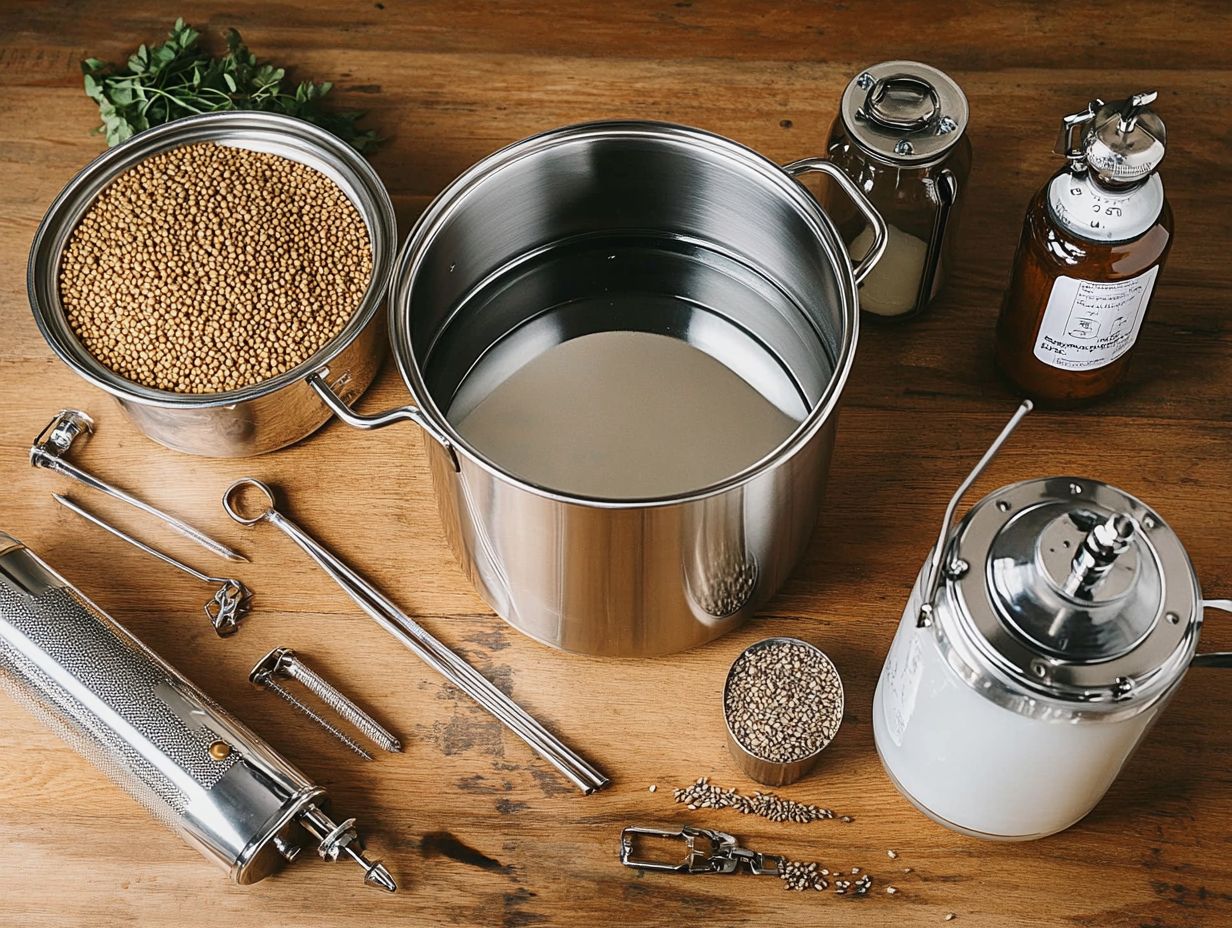
Sanitization supplies are absolutely essential in your homebrewing journey. They ensure that all your brewing equipment stays free from unwanted bacteria and wild yeast that could spoil your meticulously crafted beer.
By using high-quality cleaning solutions and sanitizers, you not only safeguard the fermentation process but also enhance the overall health and quality of your final product.
Applying effective sanitizers to your fermentation vessels, brewing tools, and other equipment creates a pristine brewing environment. This is crucial for producing top-notch beer and steering clear of off-flavors.
Selecting the right type of sanitizer is key. Options like iodophor, Star San, and bleach each possess unique properties and effectiveness.
Some sanitizers act swiftly and require no rinsing, while others necessitate a thorough rinse to eliminate any residual chemicals.
As a homebrewer, recognizing that sanitizing your equipment both before and after use significantly reduces the risk of contamination is vital.
By cultivating a meticulous sanitization routine, you maintain the integrity of your brew, ultimately leading to a more flavorful and enjoyable outcome.
5. Brewing Software or Apps
Utilizing brewing software or apps can significantly elevate your homebrewing experience, providing you with the tools necessary to track the fermentation process, manage your recipes, and calculate essential brewing metrics. These digital solutions empower you to monitor temperature fluctuations, adjust ingredient quantities, and even predict the potential alcohol content of your brews. This allows for more informed decisions throughout your brewing journey.
Incorporating these tools with your brewing methods enhances overall efficiency. By embracing technology, you can enhance your chances of success. Additionally, you can transform your brewing adventures into more efficient and enjoyable endeavors.
These applications often feature logging capabilities for fermentation stages, including gravity readings and tasting notes, which are invaluable for fine-tuning your future recipes. Many platforms also offer community spaces where you can share your triumphs and insights, fostering a collaborative environment among fellow enthusiasts.
The ability to swiftly access historical data enables you to replicate or refine your best batches with remarkable precision. Joining online forums and local clubs can provide additional support and camaraderie.
All these technological advancements not only streamline your brewing workflow but also deepen your understanding of brewing science, ultimately leading to more flavorful and consistent beer. Leveraging tools like wort chillers (devices that cool your wort quickly after boiling) and propane burners (used for heating your brew) can further enhance your brewing efficiency.
What Is Home Brewing and Why Is It Popular?
Home brewing is your gateway to the world of crafting beer in small batches, designed specifically for your personal enjoyment. It invites you to delve into the brewing process, allowing you to create unique craft beers that cater to your individual palate. This exciting hobby is booming, thanks to its creative potential and the sheer joy of producing quality beer. Utilizing beer kits and experimenting with different brewing techniques can further enhance your homebrewing experience.
You have the freedom to experiment with a variety of ingredients and brewing techniques, choosing from methods like extract, all-grain, or partial mash kits each offering a unique approach to your brewing journey. Incorporating unique yeasts like Kveik yeast can also add distinctive flavors to your brews.
The vibrant community of homebrewers enhances the experience, as enthusiasts like you share tips, techniques, and a genuine passion for brewing exceptional beer. Engage with online communities and local clubs to share your brewing adventures and learn from others.
The allure of home brewing is steeped in a rich history that stretches back to ancient civilizations, where people crafted beer for communal gatherings and personal enjoyment. Today, many are attracted to this hobby not just for the pleasure of creating their own beverages, but also for the camaraderie it fosters.
Local clubs and online forums provide a platform for you to share experiences, spark each other s creativity, and exchange invaluable brewing knowledge. This spirit of collaboration nurtures a sense of belonging within the community, encouraging you to appreciate not only the final product but also the journey itself.
You learn from your mistakes, celebrate your successes, and continuously evolve your craft, making each brewing session a new adventure. Sharing your triumphs and insights can inspire others and create lasting connections.
Join the brewing revolution and craft your own masterpieces today!
What Are the Different Types of Home Brewing Equipment?
As a home brewer, you re ready to explore exciting brewing equipment that will elevate your craft! Each piece is designed with a specific purpose, contributing to the art of crafting exceptional beer.
Essential tools in your arsenal include the brewing kettle for boiling the liquid extracted from grains, known as wort, and fermenters to help the fermentation process. You ll also need fermentation containers that cradle your beer during this critical phase.
Many brewers find comfort in opting for brewing kits, which bundle all the necessary equipment and ingredients. This makes it easy for beginners to embark on their journey of creating delicious brews.
Consider the mash tun, a vital component for those venturing into all-grain brewing. It allows for precise temperature control and efficient extraction of sugars from grains, ensuring a quality base for your beer.
Equip yourself with hydrometers to measure specific gravity and sanitizers to keep everything clean. Cleanliness is paramount to avoid contamination.
Popular brewing kits from brands like Northern Brewer or Brew Craft make it easy for novices to dip their toes into the brewing world without feeling overwhelmed by complexity. As your skills grow, you can explore an array of advanced tools, such as kegging systems or sophisticated temperature controllers, further refining your brewing prowess and elevating the quality of your beer to new heights.
How Can Accurate Measuring Tools Improve the Brewing Process?
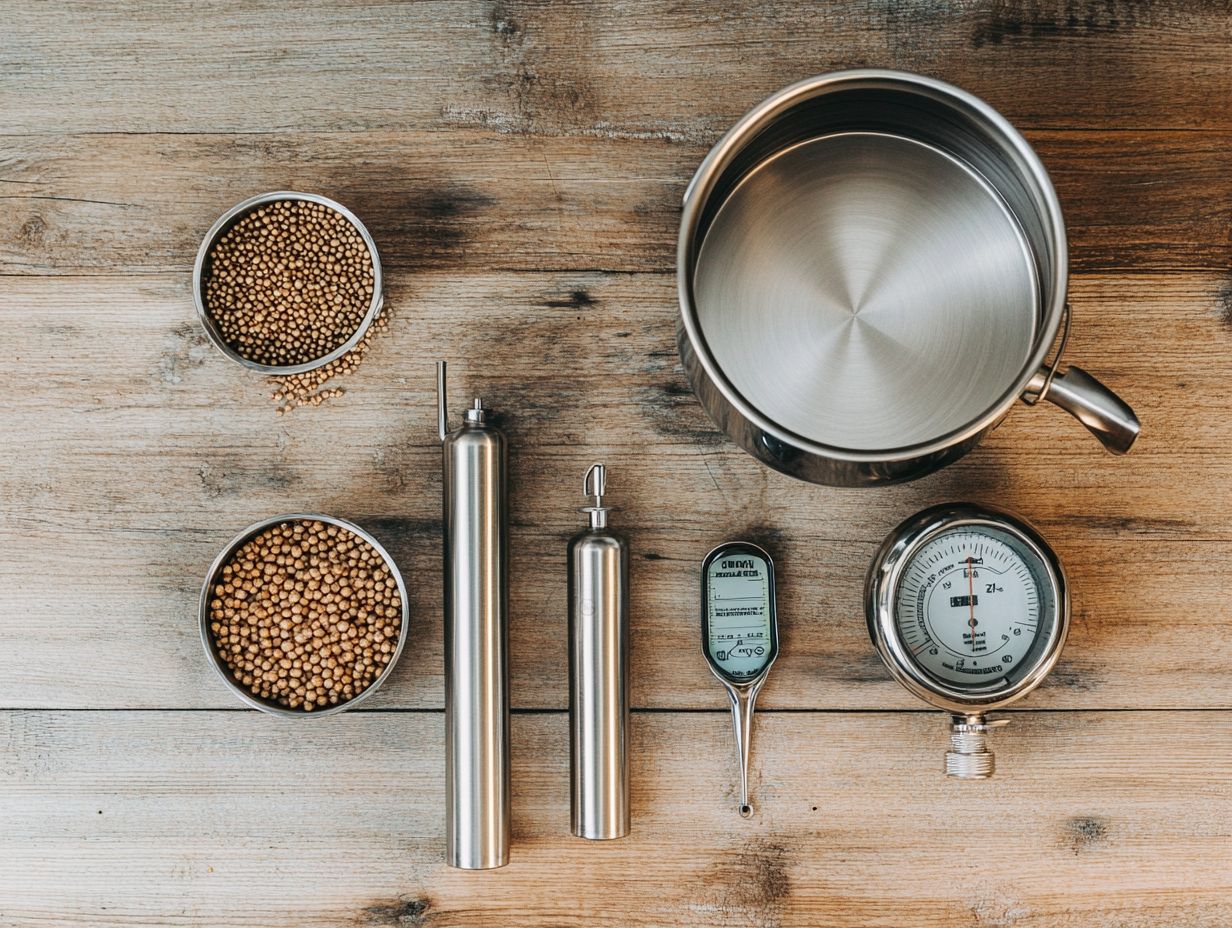
Utilizing precise measuring tools, such as hydrometers and brewing scales, can significantly enhance your brewing process by ensuring accurate ingredient proportions and effectively monitoring fermentation progress.
With accurate data in hand, you ll have the ability to replicate your successful batches. This will ultimately elevate your craft to new heights.
A refractometer can serve as an excellent companion to your hydrometer, providing quick sugar readings that are invaluable during both the brewing and fermentation stages.
Using graduated cylinders for liquid measurements guarantees that your water additions are exact, effectively preventing inconsistencies in taste and aroma. The synergy of these tools helps you achieve the desired flavor profiles and aids in refining your brewing technique over time.
By embracing these precise instruments, you can relish the rewarding experience of creating exceptional beers with every brew!
Start brewing today and enjoy the incredible flavors of your homemade beer!
Why Is a Reliable Thermometer Important in Home Brewing?
A reliable thermometer is an essential tool in your home brewing arsenal, as temperature control significantly influences the fermentation process and, ultimately, the quality of your beer. During critical stages like mashing and boiling, maintaining the correct temperature directly affects enzyme activity, hop addition, and yeast performance.
By utilizing a high-quality thermometer, you can make precise adjustments, avoiding off-flavors caused by temperature fluctuations. This leads to a superior final product. It s this meticulous attention to detail that separates great home brews from the ordinary.
Temperature regulation is pivotal throughout the brewing journey, especially during mashing, where the ideal temperatures activate the enzymes that convert starches to sugars. If the temperature dips too low, those enzymes can become ineffective, resulting in a weak beer with lower alcohol content.
On the flip side, if the temperature soars too high, you risk creating unwanted flavors and diminishing yeast vitality during fermentation. This is precisely why investing in a precise thermometer can be a game changer for you, granting the ability to monitor these crucial phases closely.
Make informed adjustments that elevate your brew to new heights!
Start brewing today and enjoy the incredible flavors of your homemade beer!
What Are the Benefits of Using Sanitization Supplies in Home Brewing?
Utilizing sanitization supplies in your home brewing endeavors brings a wealth of benefits. It ensures that your brewing equipment remains free from unwanted microorganisms that could compromise the quality of your beer.
Proper sanitization safeguards the fermentation process and elevates the overall taste and aroma of your finished product. Using effective cleaning solutions on your brewing equipment, fermenters, and utensils helps prevent off-flavors and spoilage, resulting in a more enjoyable brewing experience and a higher caliber of beer.
To achieve this, familiarize yourself with the various sanitization methods available. These include chemical sanitizers like iodine and chlorine-based solutions, as well as non-chemical options such as boiling water and steam. Each method has its own advantages and varying effectiveness against a range of contaminating organisms.
Adopting best practices, such as routine cleaning before and after each brew session, using dedicated tools, and ensuring thorough rinsing, will significantly enhance your chances of successful fermentation.
Incorporating these sanitization techniques into your brewing process will transform your brewing experience and lead to superior beer quality!
How Can Brewing Software or Apps Help with Home Brewing Success?
Brewing software and apps are invaluable tools that can significantly enhance your home brewing success. They streamline the entire brewing process and provide crucial insights into managing fermentation.
With features like recipe calculators, temperature tracking, and fermentation monitoring, these digital resources empower you to make data-driven decisions that result in higher quality beer. By leveraging technology, you can minimize the trial and error often associated with brewing and focus on perfecting your techniques.
Many brewing applications also provide advanced analytics that enable you to track batches over time, analyze flavor profiles, and document your preferences for future reference. If you re just starting out, these platforms often include tutorials and troubleshooting guides, making the learning curve much more manageable.
For those with more experience, collaborative features allow for recipe sharing and peer feedback, fostering a vibrant community of innovation. Whether you re experimenting with unique ingredients or sticking to traditional styles, you ll find immense value in using brewing software to elevate your craft.
Frequently Asked Questions
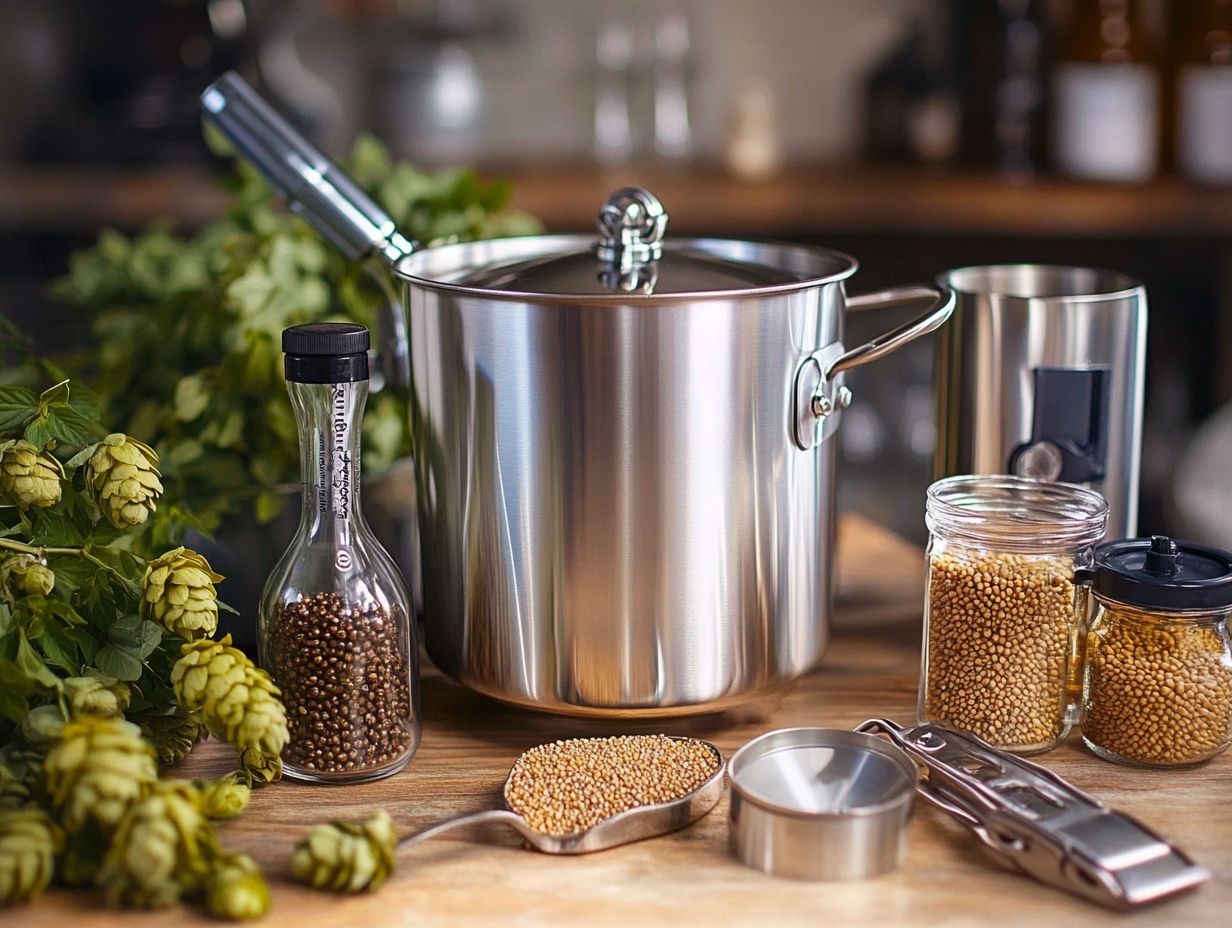
What are the 5 essential tools for home brewing success?
The 5 essential tools for home brewing success are a thermometer, hydrometer, fermenter, siphon, and bottles or kegs.
Why do I need a thermometer for home brewing?
A thermometer is essential for monitoring the temperature of your brew during the brewing process. Different types of beer require different temperatures for optimal fermentation and flavor.
What is the purpose of a hydrometer in home brewing?
A hydrometer measures the specific gravity of your brew, indicating the sugar content and alcohol level. This is crucial for determining when your beer is ready for bottling or kegging.
What type of fermenter should I use for home brewing?
There are various types of fermenters available, including plastic buckets, glass carboys, and stainless steel conical fermenters. Each has its own advantages, but the most popular choice among home brewers is a plastic bucket due to its affordability and durability.
Why is a siphon important for home brewing?
A siphon transfers your beer from the fermenter to bottles or kegs. This is a more efficient and sanitary method compared to pouring, as it minimizes the risk of contamination and oxidation.
Do I need to have bottles or kegs for home brewing success?
Yes, bottles or kegs are necessary for storing and serving your home brewed beer. It is recommended to use glass bottles with a capping tool or a kegging system for more professional and consistent results.

